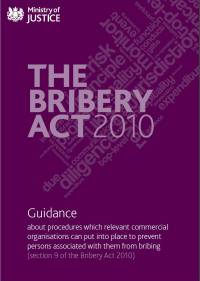 With the recent release of the Guidance under the UK Bribery Act, I decided to pull together some other stories:
With the recent release of the Guidance under the UK Bribery Act, I decided to pull together some other stories:
Howard Sklar decided to start from the back of the guidance and give his thoughts on the case studies:
- Case Study #1: Facilitation Payments<
- Case Study #2
- Case Study #3: Junior Varsity…I Mean, JVs
- Case Study #4: Hospitality
- Case Study #5: Great Job!
From Securities Docket, Avoiding Prosecution Under the UK Bribery Act-Playing Offense and Defense, including Vivian Robinson, Q.C. discussing the position of the UK’s Serious fraud office.
Bribery Act in force from July 1: Ken Clarke’s statement in full from Bribery Act .com
“Today I have announced that the Bribery Act will enter into force on July 1st, replacing and bringing together the current bribery laws which date back to 1889. I am also publishing guidance to businesses about how they can reduce their exposure to bribery and understand the Act. This guidance is available on the Ministry of Justice’s website here http://www.justice.gov.uk/guidance/bribery.htm
UK Bribery Act guidelines: has the lobbying worked? By Helen Parry, senior regulatory intelligence expert, Complinet
Seemingly unnerved at the anti- Bribery Act lobby’s dire predictions of British corporations losing out to competitors hailing from jurisdictions with a more relaxed approach to such matters, the Ministry of Justice appears to have taken heed. This is clearly demonstrated by the reassuring, empathetic and positively emollient tone employed in the revised version of the guidance for companies issued last week, particularly when sensitive issues such as facilitation payments and corporate hospitality are being addressed. This change of heart can be clearly discerned by comparing the original and revised versions of the case study on facilitation payments featured in the guidance documents.
UK Bribery Act guidance fails to clarify compliance issues by Mark Sands on Risk.net
New guidance from the Ministry of Justice and the Serious Fraud Office (SFO) on the UK’s Bribery Act does not clear up issues of prosecutorial discretion, according to first responses to the papers.
The papers are designed to clarify both the way in which the new bribery laws will be enforced and the appropriate procedures that firms can put in place to make sure they are not liable. However, sources have responded by saying that, while the guidance does help in some areas, it also muddies the waters.
“I think the issue is that this new guidance doesn’t have force of law, so it’s up to the SFO and the courts to decide to prosecute,” says one source at a UK consultancy. They say although Kenneth Clark, in his role as the UK’s secretary of state for the Ministry of Justice, is required to provide guidance to firms, it is not absolute. “You could actually do everything it says and still be prosecuted. Because it’s not prescriptive guidance, it won’t give you the silver bullet,” they say.
Don’t get hysterical – taking an extra biscuit won’t get you arrested under the Bribery Act by Andrew Clark in the Guardian
Rather like the All Blacks performing the haka, a full-scale tantrum by Britain’s business elite can be majestic in its fury. So it was difficult to ignore the histrionic reaction afforded to Jack Straw’s Bribery Act, which got royal assent in the dying days of the Labour government.
The act, intended to update a patchwork of anti-corruption legislation dating back to 1906, clamps down on backhanders, sweeteners and brown envelopes lubricating the progress of transactions and is largely aimed at British companies operating overseas.
Good Act, Deplorable Guidance from Transparency International
Corruption matters to the UK Government. Taking a strong anti-corruption stance should allow the UK to speak with authority at times when it matters, such as in Afghanistan and in the Arab Spring. The new Government is a year old, and has yet to set out its anti-corruption strategy. Judged by its deplorable approach to the Bribery Act, it has made a very poor start.
Life After Guidance: No Change by Michael Volkov in the FCPA Blog
What now? Companies need to review existing anti-corruption programs and make sure U.K. compliance is covered. Because one fact has always been certain: No one wants to become known as the first defendant in a prosecution under the Bribery Act.
‘Questionable Guidance’ From Justice Secretary by Bill Waite in the FCPA Blog
The recent friction between the SFO and Lord Justice Thomas and Mr Justice Bean suggest to me at least that the judiciary will remain staunchly independent in this area and reject guidance where they consider that it conflicts with the statute.
